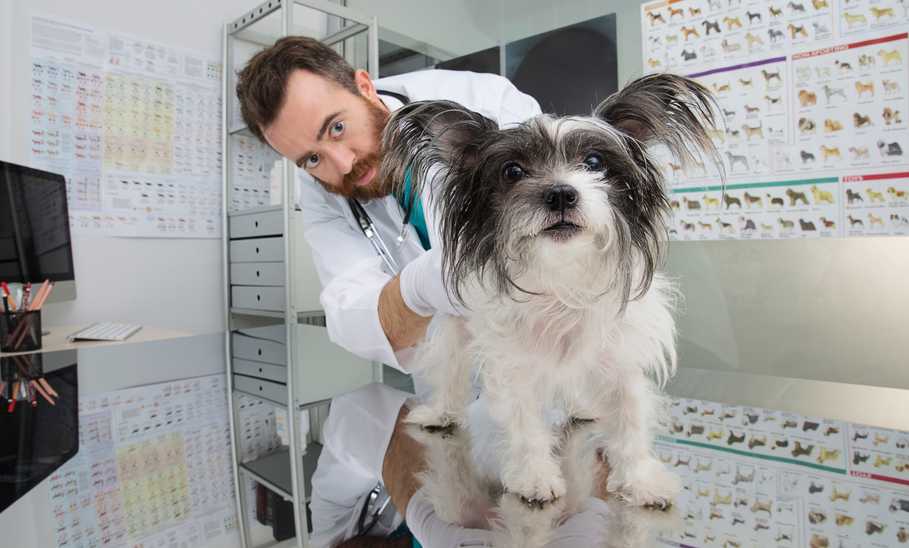- Special features: Screens for 350+ breeds, tests for over 250 genetic health risks, tests for 35+ traits like size, coat, and grooming needs
- Results ETA: 2 - 4 weeks
- Price on publish: From $127.00
Best Dog DNA Test Kits: A Veterinarian’s Review

Our evaluations and opinions are not influenced by our advertising relationships, but we may earn a commission from our partners’ links. This content is created by TIME Stamped, under TIME’s direction and produced in accordance with TIME’s editorial guidelines and overseen by TIME’s editorial staff. Learn more about it.
If you’ve been curious about your pup’s heritage, you may be surprised to learn about the existence of dog DNA test kits. Similar to the ones made for humans, these canine versions look at genetic markers that provide information about breed. Though there are multiple dog DNA test kit brands, quality can vary. In my opinion, as a veterinarian, the top two are clearly Embark and Wisdom Panel. Embark tests over 230,000 genetic markers, which they say is more than twice that of their top competitor, Wisdom Panel. Wisdom Panel says they’re the most accurate for dog breed testing.
I’ve rounded up several kits by each of them and you can decide which you prefer based on your needs. If you have the means, it could be fun to run a test from each company for personal comparison.
![[object Object] [object Object]](https://shop.embarkvet.com/cdn/shop/files/BH-1G_02ba0960-2392-48b1-a2b4-fb46158247fe_1024x1024@2x.jpg?v=1700153775)
Embark’s research partnership with Cornell University’s College of Veterinary Medicine—which is consistently ranked in the top three veterinary colleges in the United States—is a key factor in what makes them a leader in dog DNA test kits. Whether you’re curious about your dog’s breed or you want an idea of how much they’ll weigh as an adult, Embark has a lot to offer. Fun fact: Embark is also the official dog DNA test brand for Westminster Kennel Club.
With their multiple DNA test kits, transparency about accuracy, and research collaboration with a top-notch college of veterinary medicine, Embark is the overall winner in my book.
![[object Object] [object Object]](https://images.prismic.io/wisdom/860abdf2-4fe4-4614-a890-c55f6e7a7fd7_2023-06-21_Wisdom-Panel_Web_v6-Update_PDP_Premium+%284%29.png?auto=compress%2Cformat)
This test offers extensive health insight and it’s processed in a human-grade lab. Wisdom Panel is also a partner of the Orthopedic Foundation of America (OFA), which, among other things like funding research, gathers canine genetic information in voluntary databases.
With screening for over 265 genetic conditions and a phone consultation for ‘at risk’ findings, Wisdom Panel Premium is a great choice.
![[object Object] [object Object]](https://shop.embarkvet.com/cdn/shop/files/BID-1G_1024x1024@2x.jpg?v=1700153775)
Embark’s website states, “Of the mixed breed dogs that Embark has tested, 80% had a breed contribution small enough that only Embark would detect it.” This makes Embark’s Breed Dog DNA Test the best choice for mixed breed dogs.
Find out what breeds your dog is in this easy to read report and then compare notes if you opt to connect with relatives who are also in the database.
![[object Object] [object Object]](https://shop.embarkvet.com/cdn/shop/files/PB-1G_1024x1024@2x.jpg?v=1700153775)
As with the other Embark health test kits, their screening for purebred dogs can help identify genetic risk for conditions affecting various parts of the body, such as the eyes, heart, skin, and the musculoskeletal system. They also screen for the MDR1 drug sensitivity mutation. Keep in mind that having a genetic risk for a disease is not a clinical diagnosis. More on this later.
If you’re interested in a breed-specific option, e.g. you want a test that specifically is for the genetic risks of a French bulldog, consider Orivet’s Purebred DNA test. However, I couldn’t find information where they state a percentage for how accurate their tests are.
If you want a report on possible health risks for your purebred pup, this DNA test kit is a great choice.
![[object Object] [object Object]](https://images.prismic.io/wisdom/fb55170a-6035-4def-9c52-6f4cc2b71071_breeddiscovery2pt0-slide-1%402x.jpg?auto=compress%2Cformat)
Wisdom Panel states they have the world’s largest breed database which covers all AKC registered breeds and some rare breeds as well. However, if your dog is a mixed breed, pick Embark’s Breed Dog DNA Test, which is more accurate. For mixed breeds, Wisdom Panel’s Breed Discovery is 93% accurate according to veterinary geneticist, Dr. Angela Hughes.
Identify your dog’s breeds and possibly find some of your pup’s relatives with the Wisdom Panel Breed Discovery test kit.
![[object Object] [object Object]](https://shop.embarkvet.com/cdn/shop/files/Age-1_720x.jpg?v=1699550739)
There are two DNA-based age test methodologies and Embark uses the most accurate, called methylation. In human medicine, methylation has been well established as being able to determine the biological age of any tissue. Methylation is also being researched to evaluate things like life expectancy. Biological age is different from chronological, or calendar, age, which I’ll discuss in more detail later. Methylation, however, can also estimate calendar age and that is what Embark provides with this kit.
If you want to find out an age range estimate for your dog, Embark uses the most accurate methodology.
![[object Object] [object Object]](https://images.prismic.io/wisdom/7e6bb46b-2fdf-41cc-9ee5-a8d3d8fd10c2_2023-06-21_Wisdom-Panel_Web_v6-Update_PDP_Essential.png?auto=compress%2Cformat)
With the world’s largest breed database, Wisdom Panel Essential is reasonably priced. This DNA test kit is easy to use and gives you breed information and some limited health screening.
For the price and quick turnaround time, this is a great breed DNA test with some health and trait tests as well.
Both Embark and Wisdom Panel have a large database and multiple test kits options. Some of their competitors offer one or two options for kits (e.g. Basepaws and Ancestry offer one, Koko Genetics offers two). And on both Embark and Wisdom Panel’s websites, it’s easy to find their accuracy information with an actual percentage given.
Both Embark and Wisdom Panel are also partnered with reputable research organizations: Embark with Cornell University College of Veterinary Medicine, and Wisdom Panel with Morris Animal Foundation, OFA, and others. Both also use human-grade labs. (And I’m not saying that the other companies aren’t partnered with reputable places and don’t use human-grade labs.) Ultimately, the upfront transparency about accuracy—with a stated percentage—was a major factor in why I chose Embark and Wisdom Panel above their competitors.
Dog DNA tests are a way for pet owners, dog breeders, and veterinarians to learn more about an animal’s genetic makeup. An at-home DNA test kit collects cells from the inside of your dog’s mouth, which are then used to analyze genetic material for information on breed identification, physical traits—like if your dog might experience heavy seasonal shedding—and genetic health risks. (However, positive results for a genetic risk isn’t a diagnosis. More on this later.) You mail the sample to the company and in several weeks, they email you a report.
There are also DNA tests that can be run on blood, but if your veterinarian orders these, they will draw your pet’s blood and submit the sample to a veterinary genetics laboratory.
Look for a test whose capabilities and focus meet your needs:
If your primary purpose is breed identification, then you’ll want to know how big the company’s breed database is. For example, Basepaws’ DNA test kit box says 200+ breeds (though the product description on their website says 300+).
Look for a test that offers either the most genetic disease markers or find a kit that is breed specific. Orivet offers breeds-specific kits, like a French bulldog kit, a Labrador kit, etc. But keep in mind, a positive result doesn’t automatically mean your pet will get that disease. More on this later.
Some kits offer ancestry information and the ability to find relatives in their database. Or maybe you’re interested in testing for behavior traits (like hunting-related food motivation) and physical traits like the possible weight range your puppy might fall within as an adult.
Some companies only offer one dog DNA test kit. Some have several choices ranging from mainly breed identification, screening for breeds and genetic health risks, and screening for various physical traits.
I’ll go into more detail on accuracy later, but on Embark’s website a percentage is readily provided on every single product page (99% accuracy). Others, like Wisdom Panel, have it in their FAQs section (“at least 99% accuracy”). On some companies’ pages, you can search for accuracy information, click on multiple links, and still not find an actual number, e.g. Basepaws, Koko Genetics, and DNA My Dog.
Look for a website that clearly states how big their database is. If you have a mixed breed dog and one or more of their various breeds aren’t in a company’s database, they’re not going to be able to provide you with that information. The database size is usually stated on the box itself but more information can be found on the company website. Some also include testing to determine if your dog is part coyote or wolf.
Trying a dog DNA test is helpful if you want to learn more about your dog’s breed makeup, ancestry, behavior, genetic risk factors, and physical traits. Knowing these things can help guide you in offering more informed care for your pet. (Breed and health info can even provide some data points for things like choosing the best dog food for puppies or the best senior dog food.) It’s also a fun way to potentially find some of your dog’s relatives.
This is a debated topic because dog DNA test kits aren’t regulated by the FDA and experts say there aren’t peer-reviewed publications that evaluate test kit accuracy. So essentially, you have to trust what a company tells you. And some manufacturer’s websites don’t tell you in terms of a percentage how accurate their tests are.
Other general things to keep in mind regarding accuracy is that a sufficient quantity of sample material is required, which means you need to swab your dog’s mouth for a certain amount of time. For example, Embark specifically prefers 60 seconds and not 30 seconds. Wisdom Panel says 15 seconds. Be sure to follow the manufacturer’s directions on how to swab your dog’s cheek as well as how long to wait after your dog takes medication or eats—including nursing if a dog isn’t weaned—before swabbing.
Another important factor to consider is that for genetic health screening, a positive result means your dog is at increased risk for that medical issue but it doesn’t tell you the actual probability that your dog will actually ever develop it. That’s not a question that science can answer yet. Since it’s not a diagnosis, discuss your results with a veterinarian or a geneticist at the DNA test kit company in addition to your personal veterinarian. Keep in mind that experience and knowledge about genetic testing varies among private practice veterinarians.
If your pet doesn’t have any positive results, that doesn’t automatically mean they will never develop medical issues because there isn’t a genetic test for every medical condition.
Since you’re taking a company’s word for how accurate their test is, my recommendation is to pick a product where that information is openly shared. If you search through their website for 10 minutes and have to sift through scientific jargon and you still haven’t found an answer…my personal preference would be to not buy from them.
Your dog’s breed report tells you who they are at a DNA level, and that is not all about physical appearance. In fact, Embark’s website notes that “Less than 1% of a dog’s 20,000 genes impacts appearance.”
Other things to think about are how many breeds comprise both of your dog’s parents—and their parents, etc? You can’t rely on physical appearance to determine this. To complicate things, multiple genes can affect a single physical trait.
And of the genes your dog inherited, which ones are actually being expressed? And are dominant genes being expressed or recessive genes? There are also random DNA mutations that can occur, which can affect a dog’s physical appearance.
They often use veterinary genetics laboratories for DNA testing, such as UC Davis College of Veterinary Medicine or the University of Pennsylvania’s PennGen Laboratories. Collecting a sample to submit to such a lab can sometimes involve a blood draw, which would be performed at your pet’s veterinary clinic.
Some veterinarians might also opt to use a cheek swab kit like Embark for Veterinarian DNA Test Kit. This kit provides veterinarians with more thorough information than a retail kit that pet owners can purchase online. Embark also has an online platform for veterinarians needing consultation services.
Depending on the testing method used, dog DNA can help estimate a dog’s genetic age—which can vary from their chronological age—or it can be used to estimate both. Chronological, or calendar, age is based on when your dog was born. Genetic age—or biological age—is influenced by things like environment, nutrition, and disease. Such factors can cause a dog to be younger or older in terms of genetic age. As such, genetic age can be used to predict longevity. So if a dog (or person’s) genetic age is younger than their calendar age, theoretically they’ll live longer. If the genetic age is older, a dog’s lifespan will likely be shorter.
Some dog DNA test kits include genetic age (e.g. DNA My Dog) whereas Embark—who uses a different testing modality that’s considered more accurate—offers a separate Dog Age Test Kit. The methodology that Embark uses is capable of determining both genetic age and calendar age, but the information they provide you with is an estimated range of your dog’s chronological age.
The two modalities used for estimating genetic age are telomere length and methylation, but the scope of these topics are beyond this article. More information can be found on Embark’s website and DNA My Dog’s ‘Questions about the science’ section. Interestingly, these genetic age methodologies have been researched in human medicine as a way to assess the quality of donor kidneys.
The information presented here is created by TIME Stamped and overseen by TIME editorial staff. To learn more, see our About Us page.



